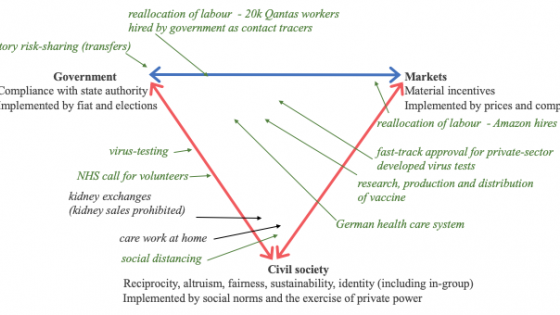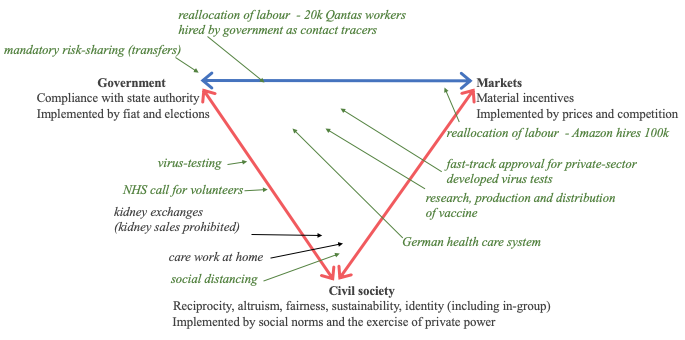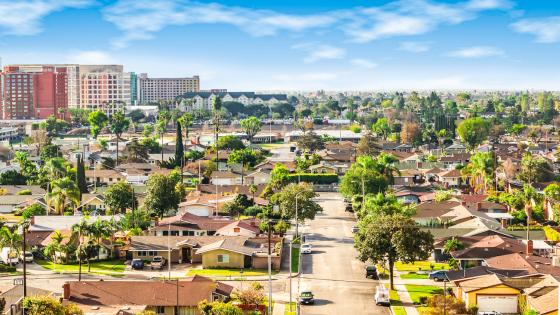The COVID-19 pandemic is a blow to self-interest as a value orientation and laissez-faire as a policy paradigm, both already reeling amid mounting public concerns about climate change. Will the pandemic change our economic narrative, expressing new everyday understandings of how the economy works and how it should work?
We think so. But it will not be simply a shift to the left on the now anachronistic one-dimensional markets-versus-government continuum shown in Figure 1. A position along the blue line represents a mix of public policies – nationalisation of the railways, for example, towards the left; deregulation of labour markets, for example, towards the right.
Figure 1 The government–market continuum for policy and economic discourse
COVID-19, for better or worse, brings into focus a third pole in the debate: call it community or civil society. In the absence of this third pole, the conventional language of economics and public policy misses the contribution of social norms and of institutions that are neither governments nor markets – like families, relationships within firms, and community organisations.
There are precedents for the scale of changes that we anticipate. The Great Depression and WWII changed the way we talked about the economy: left to its own devices it would wreak havoc on people’s lives (massive unemployment), “heedless self-interest [is] bad economics” (FDR),1 and governments can effectively pursue the public good (defeat fascism, provide economic security). As the memories of that era faded along with the social solidarity and confidence in collective action that it had fostered, another vernacular took over: “there is no such thing as society” (Thatcher)2 – you get what you pay for, government is just another special interest group.
Another opportunity for a long-needed fundamental shift in the economic vernacular is now unfolding. COVID-19, along with climate change, could be the equivalent of the Great Depression and WWII in forcing a sea change in economic thinking and policy.
And the battle for the COVID-19 narrative is already underway. The Economist sounded the alarm: “Big government is needed to fight the pandemic. What matters is how it shrinks back again afterwards. ... A pandemic government is not fit for everyday life.”3 Government overreach, we hear, led to America being unprepared. “Stringent and time-consuming FDA requirements are preventing academic and clinical labs around the country, with capacity and willingness to develop and deploy testing within their communities, from being able to do so.”4
But many Americans, Britons, Italians, Japanese and others probably wish that, like South Korea’s, their governments had done more not less at the outset, and that their fellow citizens had the civic mindedness that made the South Korean government’s policies so effective.
South Korea will be a major theatre in the battle for the COVID-19 narrative. We will hear a lot about how their success in containing the pandemic was due to their long experience with SARS, H1N1, and other epidemics in the region. Or is it the history of authoritarianism in South Korea’s politics? Or that South Koreans are, well, just more cooperative than, say, Americans?
We are not convinced. According to the authoritative Polity IV data set, South Korea is as democratic as the UK or the US.5 The US has had ample experience with epidemics. A never-released government report half a year ago simulated a hypothetical pandemic almost exactly anticipating what is now unfolding. Residents of Seoul are not, in fact, distinctive in their cooperativeness, at least not compared with people from Bonn, Boston, Zurich or Copenhagen in experiments about contributions to public goods (Herrmann et al. 2008).
Others will point to the immediate and massive testing, tracing and social distancing (all for the most part voluntary) that the South Koreans adopted, their quick mobilisation of expertise bearing on the outbreak, the extraordinary number of intensive care unit beds that were available, and their comprehensive health care system that facilitated and reduced resistance to these measures. South Korea has avoided extreme personal travel or movement restrictions and closure of airports.
But the struggle for the COVID-19 narrative need not rehearse the “more government versus more market” battle lines. Two snapshots of the unfolding pandemic explain why.
- In the UK, the National Health Service asked on 24 March for 250,000 volunteers to assist them. Recruitment to the scheme was temporarily halted five days later so that the initial 750,000 applications could be processed.6
- As of 9 April, 494,711 South Koreans have been tested for the virus, a level of participation that would have been impossible to enforce on a recalcitrant citizenry by governmental fiat.7
The COVID-19 narrative that emerges in the aftermath of the pandemic will have to embrace two truths. First, there is no way that government – however well organised and professional – can address challenges like this pandemic without a civic-minded citizenry that trusts the public health advice of its government and is committed to the rule of law. Second, people facing extraordinary risks and costs have indeed acted with generosity and trust on a massive scale.
However, another snapshot is a cause for alarm: attacks on people of Asian descent are mounting around the world, encouraged, some think, by President Trump’s continued reference to the “Chinese virus”. The post-COVID narrative will have to embrace a third truth. People may care about others in negative as well as positive ways; the frightening upsurge of xenophobic attacks is a warning.
A consequence is that we have no choice but to reconsider the liberal creed that philosophers call preference neutrality, or what in economics is associated with the title of a famous paper, “De gustibus non est disputandum" (“There is no arguing about tastes”; Becker and Stigler 1977). The liberal creed and its economic variant effectively place the idea of better-or-worse values out of bounds for public debate and policy. But because the nature of our values is essential both to combatting the COVID-19 epidemic and to preserving a democratic society, we will have to get used to “arguing about tastes”, however uncomfortable that will be.
Among our values, fairness will be something that we will argue about a lot. We are now facing decisions daily – everything from grading students who are learning remotely with differential patchy internet connectivity, to triaging access to ventilators. Compliance with lockdown regulations will fray if they unfairly penalize those unable to work from home. The result will be to place ethical considerations at the centre of our national and global deliberations. These include but go considerably beyond placing a value on human life. And their intrusion into our daily conversations will enrich our economic vernacular.
No combination of government fiat and market incentives, however cleverly designed, will produce solutions to problems like the pandemic. What we call civil society (or the community) provides essential elements of a strategy to kill COVID-19 without killing the economy.
The dual elements of the new theory – the limits of private contract and governmental fiat, along with a new view of a (sometimes) socially oriented economic actor – open up a space in which economic discourse can engage with the pandemic, as illustrated in Figure 1. The blue line at the top is the left-right (government-versus-market) continuum of choices that has dominated policy debates for a century. We develop these ideas further in a related paper (Bowles and Carlin 2020).
Figure 2 An expanded space for policy and economic discourse
Note: the green arrows place COVID-19 related policies in the space; the black arrows are other examples.8
A point in the space opened up by the third pole, which we label civil society, has a similar meaning to a point on the bipolar blue government-versus-markets line. It represents how solutions to societal challenges can be implemented through a weighted combination of government fiat, market incentives, and civil society norms. (Coordinates of a point sum to one. The weight of each of these is the shortest distance of the point from the edge opposite the vertex in question. So, a solution represented by the vertex itself, such as “mandatory risk-sharing (transfers)” in the figure has a weight of 1 on government and zero weights for market and civil society.)
We characterise the motivations central to the workings of civil society by a series of other regarding or ethical values including reciprocity, fairness, and sustainability. Also included is the term identity, by which we refer to a bias in favour of those who one calls “us” over “them.” We draw attention to this aspect of the civil society dimension to stress that in insisting on the importance of community in fashioning a response to the pandemic, we recognise the capacity of these community-based solutions to sustain xenophobic, parochial, and other repugnant actions.
Figure 2 illustrates the location in “institution-space” of different responses to the epidemic. At the top left is the government as the insurer of last resort. Neither market nor household risk-sharing can handle an economy-wide contraction of activity required by containment policies; and neither can compel the near-universal participation that makes risk pooling possible.
Closer to the civil society pole are social distancing policies implemented through consent. The triangle opens up space for modern-day analogues of the so-called Dunkirk strategy – small, privately owned boats took up where the British navy lacked the resources to evacuate those trapped on the beaches in 1940. An example is the public-spirited mobilisation by universities and small private labs of efforts to undertake production and processing of tests and to develop new machines to substitute for scarce ventilators.
These examples underline an important truth about institutional and policy design: the poles of the institution space – at least ideally – are complements not substitutes. Well-designed government policies enhance the workings of markets and enhance the salience of cooperative and other socially valuable preferences. Well-designed markets both empower governments and make them more accountable without crowding out ethical and other pro-social preferences.
Much of the content that we think is essential to a successful post-COVID-19 economic vernacular is present in two recent advances in the field.
The first is the insight – dating back to Hayek – that information is scarce and local. Neither government officials nor private owners and managers of firms know enough to write incentive-based enforceable contracts or governmental fiats to implement optimal social distancing, surveillance, or deployment of resources to the health sector, including to vaccine development.
The second big change in economics gives us hope that non-governmental and non-market solutions may actually contribute to mitigating problems that are poorly addressed by contract or fiat. The behavioural economics revolution makes it clear that people – far from the individualistic and amoral representation in conventional economics – are capable of extraordinary levels of cooperation based on ethical values and other regarding preferences.
As was the case with the Great Depression and WWII, we will not be the same after COVID-19. And neither, we also hope, will be the way people talk about the economy.
The pandemic of that era – massive unemployment and economic insecurity – was beaten by new rules of the game that delivered immediate benefits. Unemployment insurance, a larger role for government expenditures and, in many countries, trade union engagement in wage-setting and new technology reflected both the analytics and the ethics of the new everyday understanding of the economy. The result was the decades of performance referred to as the golden age of capitalism, making both the new rules and the new vernacular difficult to dislodge.
The mounting costs of climate change and recurrent pandemic threats could support a similar symbiosis between a new economic vernacular and new policies and institutions yielding immediate concrete benefits. A first step will be to reject the economists’ fiction that a liveable future can be based solely on the pursuit of material self-interest. We will need to cultivate and empower the civic virtues that have underpinned many of the successes in battling COVID-19.
References
Becker, G S and G J Stigler (1977), "De Gustibus Non Est Disputandum", American Economic Review 67(2): 76-90.
Bowles, S and W Carlin (2020), "Shrinking capitalism", American Economic Review, Papers and Proceedings 110(5).
Herrmann, B, C Thoni, and S Gaechter (2008), "Antisocial Punishment Across Societies", Science 319: 1362-1367.
Kolm, S-C (1984), La bonne economie: La reciprocity generale, Presses Universitaires de France.
Ostrom, E (1990), Governing the Commons: The Evolution of Institutions for Collective Action, Cambridge University Press.
Ouchi, W (1980), "Markets Bureaucracies and Clans", Administrative Science Quarterly 25: 129-141.
Endnotes
1 From his second inaugural address on 20 January 1937.
2 Keith Joseph Memorial Lecture, 1996.
3 https://www.economist.com/leaders/2020/03/26/the-state-in-the-time-of-covid-19
4 https://elemental.medium.com/the-science-behind-coronavirus-testing-and-where-the-u-s-went-wrong-7920c3fb5049
5 https://en.wikipedia.org/wiki/Polity_data_series (data for 2018).
6 https://www.england.nhs.uk/participation/get-involved/volunteering/nhs-volunteer-responders/
7 KCDC, Updates on COVID-19 in Republic of Korea 5 April 2020
8 Similar tri-partite representations of the regulation of social interactions, broadly construed, have been suggested – for example, plan, market, reciprocity in Kolm (1984), or bureaucracy, market and clan in Ouchi (1980). For Elinor Ostrom, the third dimension was local, informal self-government (Ostrom 1990).





